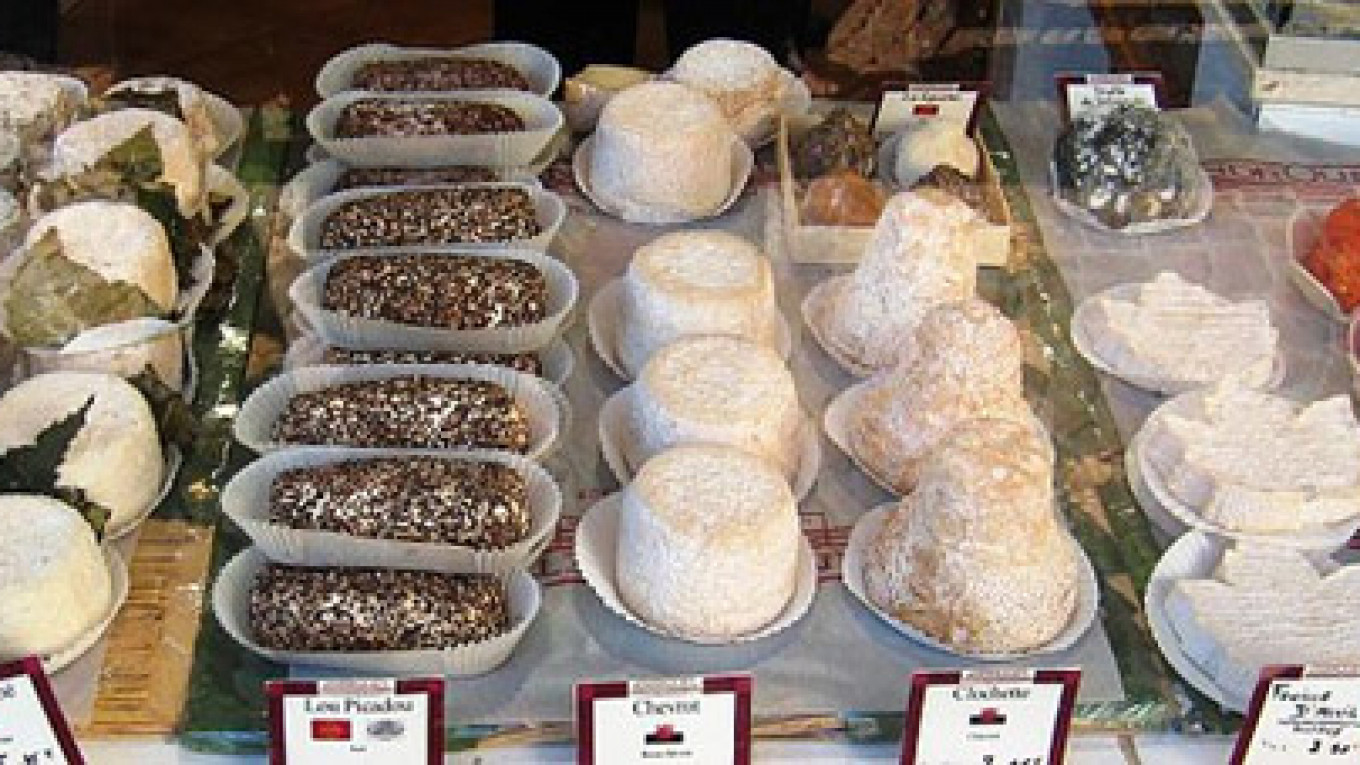I find President Vladimir Putin annoying at the best of times, but this month my distaste has blossomed into unbridled loathing. By imposing sanctions on food imports from the U.S., the EU, Canada, Japan and Norway, Russia's kefir-drinking head of state scuppered my chances of making a decent plate of "cacio e pepe" or a batch of brownies for the next calendar year.
An entire section of the once expansive dairy aisle at one market is empty and shuttered with a sign citing "technical difficulties" where once Irish butter, French creme fraiche and Finnish skimmed milk stood proudly alongside Russian smetana, kefir and tvorog.
Heading back to Moscow from Italy yesterday, I loaded up my suitcase with 4 1/2 kilograms of parmesan and vacuum-packed smoked ham. Less than a week ago they were available at select grocery stores and wholesalers. Now everyone is scrambling to stock up on supplies.
With the food ban Putin has also hammered the final nail into my professional coffin. I write about two things: humor and food in Russia. 2014 hasn't been a bumper year for humor in Russia, and now the foodie story is all but pipped at the post.
And I was on a roll with the food story. I write a blog called "The Moscovore: Culinary Adventures in the Russian Capital," which gives me the best excuse in the world to spend the summer determinedly sampling all the cocktails on offer in Moscow's many eateries in the name of "research."
I wrote articles for magazines, detailing the very pleasing trend of hipster Russian chefs throwing off the yoke of Soviet-era stodgy fare, looking instead to pre-revolutionary recipes for inspiration, updating them with new flavors and textures from the abundant international foodstuffs on offer in Russia.
I led walking tours of Moscow's farmers' markets, initiating expats into the secret kiosks selling Italian buffalo mozzarella and French fondant icing. I was actually playing with the idea of writing a cookbook.
So now what? When I moved to Moscow in 1993 to set up house with my HRH (horrible Russian husband) there was hardly any imported food in Russia at all, and what there was hard to get and prohibitively expensive.
I spent a lot of my time foraging around markets and grim food stores for fresh fruit and vegetables, along with quality meat and poultry. The best thing there was were American chicken legs and thighs, nicknamed "Bush legs," and I get the sense that this time around, they won't be on the menu.
The 20 years I have lived in Russia have seen sweeping socioeconomic and political changes in the country, but for me the milestones have all been culinary. Until last week, the progress was always linear: As I became a more confident and creative cook, Russia kept pace with more and more international foodstuffs available to satisfy ever more cosmopolitan and global palates.
With a stroke of a pen, Putin has turned the foodie clock back two decades.
Russians believe that August is an accursed month, bringing with it unforeseen disasters, such as the tragic sinking of the submarine Kursk, the 1998 financial crisis and the 2008 invasion of Georgia.
For expat and Russian foodies like me, this year's disaster is privation, and we are heading back to Russia with suitcases full of banned products. The rah-rah Russia types stoutly declare that French brie or Polish apples are a small price to pay for the glory of the annexation of Crimea.
"We will live on buckwheat and potatoes!" they shout.
Let them. I want my sushi back.
Jennifer Eremeeva is a food writer living in Moscow. This comment originally appeared in Reuters.
A Message from The Moscow Times:
Dear readers,
We are facing unprecedented challenges. Russia's Prosecutor General's Office has designated The Moscow Times as an "undesirable" organization, criminalizing our work and putting our staff at risk of prosecution. This follows our earlier unjust labeling as a "foreign agent."
These actions are direct attempts to silence independent journalism in Russia. The authorities claim our work "discredits the decisions of the Russian leadership." We see things differently: we strive to provide accurate, unbiased reporting on Russia.
We, the journalists of The Moscow Times, refuse to be silenced. But to continue our work, we need your help.
Your support, no matter how small, makes a world of difference. If you can, please support us monthly starting from just $2. It's quick to set up, and every contribution makes a significant impact.
By supporting The Moscow Times, you're defending open, independent journalism in the face of repression. Thank you for standing with us.
Remind me later.


